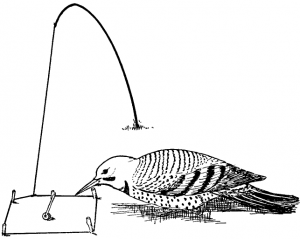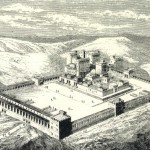 He made him master of his household, ruler over all he possessed, to instruct his princes as he pleased and teach his elders wisdom
He made him master of his household, ruler over all he possessed, to instruct his princes as he pleased and teach his elders wisdom
Psalm 105:21-22
A man can either be a servant, or a slave.
To be a servant is one who works for someone for a wage, and uses that wage to provide for their own needs. The slave, on the other hand, is fully dependant upon his master. The slave still works, but the master is in charge of the entire well-being of the individual. Whether the slave is well-provided for, or little, it is all in the hands of someone else.
Read more…
 He went on: “What comes out of a person is what defiles them. For it is from within, out of a person’s heart, that evil thoughts come—sexual immorality, theft, murder, adultery, greed, malice, deceit, lewdness, envy, slander, arrogance and folly. All these evils come from inside and defile a person.” Mark 7:20-23
He went on: “What comes out of a person is what defiles them. For it is from within, out of a person’s heart, that evil thoughts come—sexual immorality, theft, murder, adultery, greed, malice, deceit, lewdness, envy, slander, arrogance and folly. All these evils come from inside and defile a person.” Mark 7:20-23
When we think of the journey towards perfection, we must be advised what Jesus intended. Today, many have rightly understood the principles of spiritual warfare, the tactics of the enemy, and the authority of the believer. Using our authority, we can pull down strongholds and every high thing that exalts itself against the knowledge of God (2 Corinthians 10:3-5). But, one should consider another aspect of Jesus’ victory, that of His rest. That is, this is a rest that it is said the children of Israel failed to enter into. We should endeavor, therefore, not to lay hold of it. Read more…
 Thou shalt not muzzle the ox when he treadeth out the corn.
Thou shalt not muzzle the ox when he treadeth out the corn.
Deuteronomy 25:4
When you study the Law, you see an ox was not to be muzzled while working. Paul said this was not written for the ox, but for men. He said the reason for this law was called HOPE. A man ought not be so bound with profit in his mind that he muzzles his ox while plowing. When man is in a right spirit, he is generous even to beast. But this applies to us today. As we live by His Spirit, we should find ourselves generous as well, giving, and not working out of desperation, but from hope. If not, there is something bound in our hearts that Jesus would like removed so His Spirit can flow free. In the same way, all the Law of Moses points to the upright heart for God to dwell. You can’t follow it and get there, but just like the ox, you can see a picture of where how the Spirit wants to be, and, perhaps, follow. Read more…
 Jesus left the temple and was going away, when his disciples came to point out to him the buildings of the temple. But he answered them, “You see all these, do you not? Truly, I say to you, there will not be left here one stone upon another that will not be thrown down.”
Jesus left the temple and was going away, when his disciples came to point out to him the buildings of the temple. But he answered them, “You see all these, do you not? Truly, I say to you, there will not be left here one stone upon another that will not be thrown down.”
As he sat on the Mount of Olives, the disciples came to him privately, saying, “Tell us, when will these things be, and what will be the sign of your coming and of the close of the age?”
Matthew 24:1-3 (emphasis mine)
When we consider Bible prophecy of the end, we must look at Jesus’ words in the Olivet Discourse. In this discussion with His disciples, Jesus answer the disciples questions about the coming destruction of the temple and it’s buildings. The late teacher Derek Prince likened the interpreting Bible prophecy in terms of reassembling a skeleton. He said that the thing you have to start with is the spine. For Bible prophecy of the end, he claimed that Matthew 24 and the parallel passages (Luke 21 and Mark 13) were the spine of Biblical Eschatology.
Read more…
Categories: Church of the Beyond, End Times, General, Revolution Tags: At That Time, Dispensationalism, Eagles, End Times, Immediately, Jerusalem, Jesus, Kingdom, Mount of Olives, Olivet, Olivet Discourse, Preterism, Rome, Teaching, Vultures
 And Adam knew Eve his wife; and she conceived, and bare Cain, and said, I have gotten a man from the LORD.And she again bare his brother Abel. And Abel was a keeper of sheep, but Cain was a tiller of the ground. And in process of time it came to pass, that Cain brought of the fruit of the ground an offering unto the LORD. And Abel, he also brought of the firstlings of his flock and of the fat thereof. And the LORD had respect unto Abel and to his offering: But unto Cain and to his offering he had not respect. And Cain was very wroth, and his countenance fell. And the LORD said unto Cain, Why art thou wroth? and why is thy countenance fallen? If thou doest well, shalt thou not be accepted? and if thou doest not well, sin lieth at the door. And unto thee shall be his desire, and thou shalt rule over him.
And Adam knew Eve his wife; and she conceived, and bare Cain, and said, I have gotten a man from the LORD.And she again bare his brother Abel. And Abel was a keeper of sheep, but Cain was a tiller of the ground. And in process of time it came to pass, that Cain brought of the fruit of the ground an offering unto the LORD. And Abel, he also brought of the firstlings of his flock and of the fat thereof. And the LORD had respect unto Abel and to his offering: But unto Cain and to his offering he had not respect. And Cain was very wroth, and his countenance fell. And the LORD said unto Cain, Why art thou wroth? and why is thy countenance fallen? If thou doest well, shalt thou not be accepted? and if thou doest not well, sin lieth at the door. And unto thee shall be his desire, and thou shalt rule over him.
Genesis 4:1-7
Hebrews 11:4 tells us that it was by faith that Abel offered a better offering than Cain.
Cain’s offering was not regarded by the Lord, as it is written, without blood there is no remission of sins (Hebrews 9:22). It required blood, in which the Lord said the life of a thing was, in order to atone for the sin of another. And, it was through the eyes of faith that Abel could perceive this. And, for whatever reason, Cain’s lack of faith, or lack of using his faith, was his failure to see.
Read more…
Categories: Church of the Beyond Tags: Abel, Atonement, Blood, Cain, Cain and Abel, Damascus, Eden, Fear, Fugitive, Jealousy, Jesus, Mark, Mark of Cain, Nod, Offering, Paul, Pride, Rebellion, Rejection, Shame, Wandering Spirit
A look at the End Times from a largely fulfilled perspective begins, primarily, with the book of Daniel. Daniel sets the scene from the foundation of the enemies empire, Babylon, with Daniel’s interpretation of the king’s dream. Daniel 2 sets the case for Rome being Babylon, and is the best case for a mostly-fulfilled End Time paradigm. Plainly put, we see a kingdom/statue beginning with King Nebuchadnezzar, with that king as the head. It ruled over the entire Earth and, although it changed identities (metal) three times, four in all, it was a continuous one-world government from the time of that king until the Kingdom of God broke it, probably circa 313AD, when it’s emperor was converted. As we saw war and conflict from each subsequent kingdom, but the entire statue remained, so we see that it’s actual destruction was not a war in on the Earth, but a spiritual overthrow of the power of that kingdom in the spiritual realm, in which it was spiritually defeated, crushed, and overthrown. When the spiritual power (beast) of Rome was destroyed, its physical and nationalist elements could then no longer be maintained, and, quite literally, the wind scattered the pieces, being the “Decline of Rome”.
Read more…
Categories: End Times, Kingdom, Revolution, Teaching, Video Tags: Babylon, Daniel, Decline of Rome, End Times, Greece, Jesus, Kingdom, Media, Nebuchadnezzar, Persia, Preterism, Revived Roman Empire, Statue, Video
 Jesus saith unto him, I am the way, the truth, and the life: no man cometh unto the Father, but by me.
Jesus saith unto him, I am the way, the truth, and the life: no man cometh unto the Father, but by me.
John 14:6
As Truth is a person, so is The Way. As surely as any understanding of who He was and what He taught could be expressed, it cannot be understood outside of the person of Who He Is, What He Did and Why He Did It. The Path of Life therefore, as it were, is following Jesus. For the original twelve apostles, this was through both observing who Him directly, as well as by hearing Him teach. Today, while we do not see exactly how He lived the words He preached, we have His Spirit within us to guide us into all truth.
But, most assuredly, His Words are to be obeyed. None of His Words can be fully embraced without the provision of His Spirit, but through Him, and His enabling power, we are able to overcome through faith.
Read more…
Categories: Church of the Beyond, End Times, Favorites, Teaching Tags: Beatitudes, Forgiveness, Happy, Jesus, Kingdom, Life, Path, Path of Life, Repentance, Revelation, Sermon on the Mount, Spirit
 For whosoever will save his life shall lose it; but whosoever shall lose his life for my sake and the gospel’s, the same shall save it.
For whosoever will save his life shall lose it; but whosoever shall lose his life for my sake and the gospel’s, the same shall save it.
Mark 8:35
If this life is about giving it all away, then the pathway many of us must first take is to take ownership of that which is ours.
It may seem counter-intuitive at first, to have to take possession of something, only with the intent to then lose it, but unless you take ownership of something, unless you decide that something is your right to do whatever you please with it, you will never have the authority to release that authority to whomever you choose.
Read more…
Categories: Featured, Kingdom, Revolution Tags: Bondage, Die, Dying, Faith, Forgiveness, Fruitful, Fruitfulness, Give, Jesus, Kingdom, Lose, Obedience, Treasure in a Field, Word
 In those days Judah will be saved and Jerusalem will dwell in safety; and this is the name by which she will be called: the LORD is our righteousness.
In those days Judah will be saved and Jerusalem will dwell in safety; and this is the name by which she will be called: the LORD is our righteousness.
Jeremiah 33:16
The message of holiness must flow out of the place of the Holy Spirit, or not at all. The message may be preached from other places, but there is no life of righteousness outside of the flow of the Holy Spirit. Only in the depths of Him is the message complete, is is whole, and is it pure.
There is a ditch, you see, on either side of the road. There is a an error in not going far enough as well as going too far. The difference between being “religious” in a controlling and hypocritical sense and that of being right is the Holy Spirit.
Read more…
 But he was pierced for our transgressions, he was crushed for our iniquities; the punishment that brought us peace was upon him, and by his wounds we are healed.
But he was pierced for our transgressions, he was crushed for our iniquities; the punishment that brought us peace was upon him, and by his wounds we are healed.
Isaiah 53:5
The Hebrew word picture for “iniquity” is “bent”. Iniquity is the being “bent” from straight, twisted from the upright, and made crooked from the pure. While transgression are our comissions of sin, our iniquity is the propensity, or proneness to continue to sin.
Jesus, when He died, paid for our entire nature. He covered our individual sins, and our sinfulness. He, through His righteous act and sacrificial offering, made peace with God for us, by taking upon Himself the punishment we deserved.
Read more…
He made him master of his household, ruler over all he possessed, to instruct his princes as he pleased and teach his elders wisdom




























